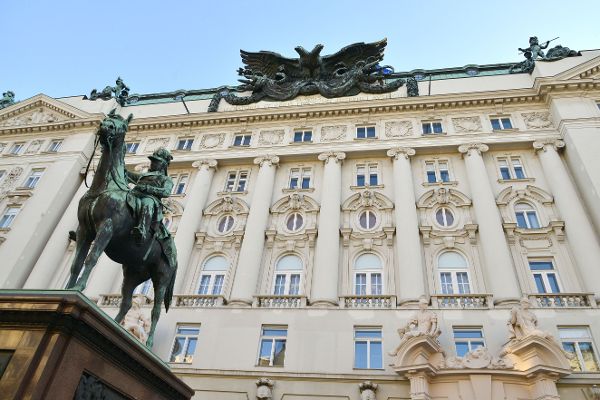Improving the environmental performance with EMAS

We are confronted with enormous challenges in environmental and climate protection worldwide. Even in Austria, we can already experience the effects of climate change up close.
The increase in hot days and extreme weather events speak for itself. Committed action in the near future will determine whether we achieve the Paris Climate Goals and thus reduce the man-made greenhouse gas effect to an acceptable level.
The Austrian Climate and Energy Strategy provides a roadmap for the exit from the fossil age. Our goal is to achieve climate neutrality for Austria by 2040. You will thus find in the current government programme 2020-2024 “Out of a sense of responsibility for Austria” a comprehensive bundle of measures aimed at finding a way how the public sector can fulfil its function as a role model and how a climate-neutral administration should be realised. One measure is the area-wide implementation of environmental management systems in the federal administration. We want to and must be a pioneer and present ourselves as a modern and future-oriented administrative organisation.
We are also trying to fulfil our role model function as a modern and future-oriented administrative organisation at our own locations. 20 years ago the former Ministry of the Environment at Stubenbastei, which was then part of the Federal Ministry of Agriculture, Forestry, Environment and Water Management, was the first Ministry EU-wide to be an EMAS organisation. Since then we have gradually integrated also the other locations in the EMAS system. Year after year, we look for potential improvements and use the valuable resources as sparingly and environmentally friendly as possible.
Ministry again certified
At the end of September 2023, another comprehensive EMAS audit was carried out. As the BML and the Ministry of Climate Protection, Environment, Energy, Mobility, Innovation and Technology (BMK) share sites, the audit was carried out jointly with the BMK. The environmental statement, too, was prepared jointly for both Ministries.
The external auditor recognised and certified the well-functioning EMAS environmental management system of the Ministry’s central unit. The audit furnished proof that the requirements of DIN EN ISO 14001:2015 are met.
The most important results
You can read about the direct environmental impact in detail in the environmental statement. The figures refer to the year 2022 compared to 2021.
Paper consumption reduced by 22 percent
We use recycled paper and office materials that have been awarded the Austrian Ecolabel at all locations. Thanks to the follow-me printer system and double-sided printing as standard, paper consumption has been reduced by 22 percent.
The Copy Service also printed 50 percent less, but still in accordance with the requirements of the Austrian Ecolabel. The Copy Service has also been awarded the PEFC label.
Green Meetings
The procurement of regional, seasonal and organic food is being promoted through the consistent organisation of green meetings and events.
Water consumption reduced
A reduction in water consumption of around 17 percent has been recorded at our locations. This reduction is partly due to the increase in working from home.
Electricity from renewable energy sources
We use district heating at our sites to provide space heating. We only use certified electricity (eco-labelled electricity) or electricity from 100 percent renewable energy sources. The use of UZ46-certified electricity not only causes significantly fewer greenhouse gas emissions, it also excludes the trade in green electricity certificates and thus possible greenwashing of electricity from fossil or nuclear sources. From 2022, all buildings of the BML's central unit and agencies have been converted to UZ46 electricity.
Business trips by car down; air travel up again
After the end of the pandemic, overall business travel (air, rail, car) increased by 12.5 percent compared to 2021/2022. This increase is mainly due to the sharp rise in flight kilometres (+594 percent). However, there has been an increase in the use of climate-friendly rail travel (+42 percent) and a significant decline in business trips by car (-57 percent).
Our Ministry has a small fleet of vehicles. Employees have access to bikes, scooters and e-scooters for business trips in Vienna.
23 percent less waste
The waste in our Ministry is already separated and properly disposed of in the offices in four-fraction waste bins.
Despite converting the lighting at Stubenring 1 to LED lamps and the resulting large quantities of hazardous waste, the total amount of waste generated fell by 23.5 percent, with a 34 percent reduction in hazardous waste in 2022.
Mixed emissions balance
The emissions balance is as follows: While emissions from energy use for electricity and district heating were reduced by 40 percent, they increased by 76 percent for business trips.
Overall, this results in a reduction of 8 percent in total emissions.
The details and the environmental programmes of both Ministries with the new measures are clearly presented in the joint Environmental Statement 2022.
This is what EMAS stands for
EMAS (Eco-Management and Audit Scheme) stands for the continuous improvement of an organisation’s direct or indirect environmental performance.
Every day the BML’s employees work hard in legislation and administration, as well as by developing and implementing future-oriented programmes, to find innovative solutions for people and the environment, thereby ensuring the protection of our livelihoods also in the future.
Of course, we endeavour to use resources as sparingly and as environmentally benign and energy-efficiently as possible, especially in the day-to-day operation of the BML. Year after year, we still manage to implement improvements in our environmental performance. The decision in favour of the EMAS system is therefore a clear commitment to a future-oriented instrument with which we want to continue to set an example. By means of an effective mixture of measures, we will contribute to the systematic further development of preventive, company-based environmental and climate protection - for now and for future generations.